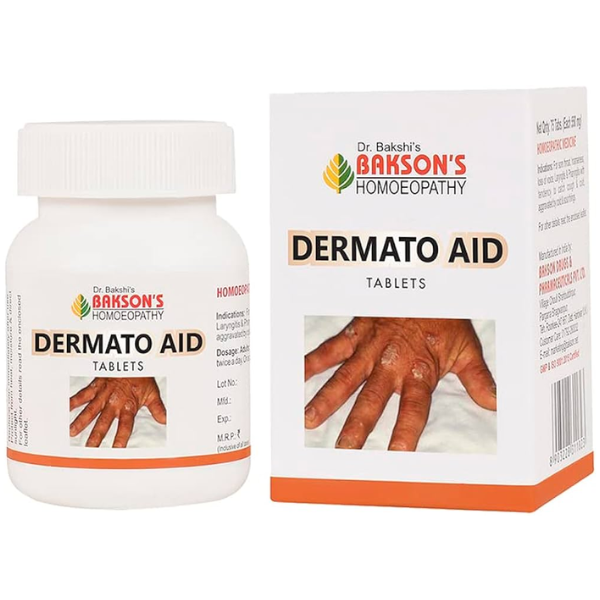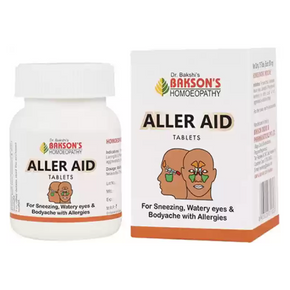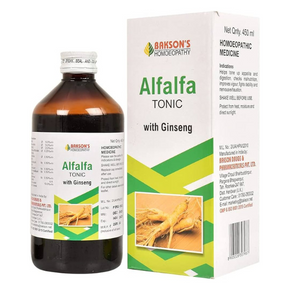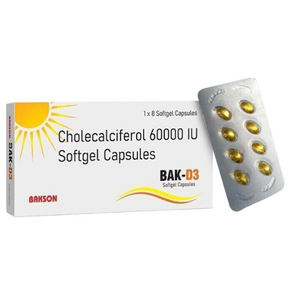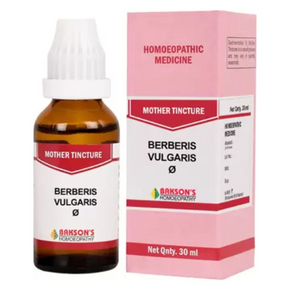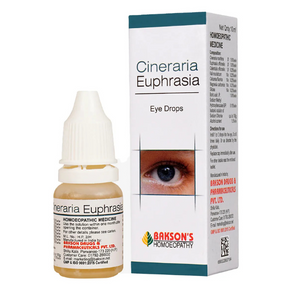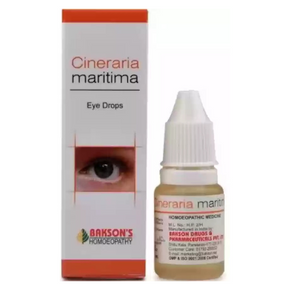- No products in the cart.
BAKSON'S HOMEOPATHY DERMATO AID TABLETS - PACK OF 2 (75 TABLETS EACH)
No reviews
Rs. 430.00
🥳 Don’t Miss 🎉 New Year Discounts till 9th Jan 2026 🤩
Fulfilled By Planet Ayurveda
Size (Per Unit): 75 Tablets
Dosage: Check below
Categories
- Clinically Tested Products
- Classical Ayurvedic Products
- Ayurvedic Products for Pets
- Herbal Combo Packs
- Single Herbal Capsules
- Poly Herbal Capsules
- Single Herb Powders
- Herbal Powder Blends
- Beauty & Cosmetics
- Herbal Tablets
- Herbal Teas
- Herbal Juices
- Herbal Syrups
- Herbal Oils
- Premium Products Range
- All Ayurveda Brands
Browse by Category
Browse by Company
Browse by Health Concern
Description
The action of each ingredient of is as follows
Psoriasis occurs when the immune system sends out faulty signals that speed up the growth cycle of skin cells. Psoriasis is not contagious. It is characterised by red, scaly patches of skin, which usually have very well defined edges. It is often symmetrical, affecting both sides of the body. The scale is typically silvery white.
Bakson's DERMATO AID helps relieve symptom of Psoriasis.
Composition
Berberis aquifolium Ø, Calcarea carbonica 6x, Graphites 5x, Hydrocotyle asiatica 2x, Natrum muriaticum 5x.
Indications
Helps relieve scaling (exfoliation of skin) and thickening of Epidermoid layer in Psoriasis.
Dosage
For Psoriasis
- Adults: Start with one tablet once on Monday & Thursday, twice in a week. Improvement is seen, as dryness, scaling and itching of the skin reduces. Continue the medicine till the symptoms disappear. In case of no improvement after fifteen days, you may increase to one tablet alternate day for two weeks. In certain sensitive patients there may be aggravation in that case you may reduce the dosage to one tablet once in a week.
- Based upon the response after one month the dosages can be increased in case of no improvement which is very rare from alternate day to once a day, up to twice daily at the interval of 15 days each. Usually most of the patients respond well within the first month.
- Children: Start with one tablet once a week. As the improvement increases, you may reduce the dosage to one tablet once in ten days and then one tablet once fortnightly.
- Maintenance dosage of once fortnightly is to be taken till the child is completely symptom free.
Contra-indication
None
Side effects
No known side effects
Psoriasis is a chronic recurrent skin disorder that causes the skin cells to multiply up to 10 times faster than normal. This results in the classic lesion characterized by a well-marginated, erythematous plaque with silvery-white surface scale. It affects 2-3% of people globally.
It can affect any part but is most commonly seen on the extensor surfaces i.e., knees, elbows and buttocks; palms and scalp, especially the anterior scalp margin may also be affected. It appears in early adulthood and can heal and come back throughout life.
Types
- Plaque psoriasis - it is the most common type presenting with the characteristic red plaque with silvery-white scale on surface.
- Pustular Psoriasis - it presents with a red and scaly skin with tiny pustules on palms and soles.
- Guttate Psoriasis - it starts in childhood or I young adults and presents with small red spots on the torso and limbs.
- Inverse Psoriasis - it presents with bright red lesions in skin folds, like the axillae, groin and under the breasts.
- Erythrodermic psoriasis - it is triggered by infection, sunburn, medications, etc., and presents with fiery red skin and shedding of scales in sheets. This type of psoriasis needs immediate treatment.
Causes
The cause of psoriasis is unknown, but studies have shown role of genetics and certain triggers which can precipitate an outbreak of this condition, which are - cuts, scrapes or surgery, stress, streptococcal infection, certain medications like beta blockers, HCQs and antimalarial drugs.
Symptoms
Symptoms vary according to the type of psoriasis, but the most common type - the plaque psoriasis presents with the following clinical features
- Well-marginated erythematous plaque with silvery white surface scale
- Plaques are itchy and painful, and may crack or bleed
- Nail changes like onycholysis, pitting or thickening of nail plate with accumulation of subungual debris
- It may be associated with Psoriatic arthritis presenting with pain and swelling in joints.
The action of each ingredient of is as follows
- Berberis aquifolium: Pimply, dry, rough, scaly. Eruptions on the scalp extending to the face and neck. Psoriasis.
- Calcarea carbonica: Unhealthy; readily ulcerating; flaccid.
- Graphites: Rough, hard, persistent dryness in portions of skin unaffected by eczema. Eruptions, oozing out a sticky exudation. Unhealthy skin; every little injury suppurates.
- Hydrocotyle asiatica: Dry eruptions. Psoriasis gyrata, on trunk and extremities, palms and soles. Circular spots with scaly edges. Intolerable itching, especially of soles. Profuse sweat.
- Natrum muriaticum: Dry eruptions, especially on the margin of the hairy scalp and bends of joints.
WARNING
Do not stop your routine prescriptions of conventional system abruptly. They are to be gradually tapered of under the guidance of your medical practitioner depending on the status of improvement
- If symptoms persist, worsen or recur frequently, consult your doctor
- Keep this and all medicines out of the reach of children.
- Store in a cool, dark & dry place.
For better results
- Take nutritious diet.
- Avoid application of cosmetic creams and lotions.
- Avoid fatty food like chocolates, nuts, dry fruits, spicy food etc. which might increase the activity of sebaceous glands.
- Exercise regularly.
Disclaimer
The information provided herein on request, is not to be taken as a replacement for medical advice or diagnosis or treatment of any medical condition. DO NOT SELF MEDICATE. PLEASE CONSULT YOUR PHYSICIAN FOR PROPER DIAGNOSIS AND PRESCRIPTION.
Talk to our Experts
Our trusted experts can help you choose the right products for your health.
Book Your Consultation Now



















.png?v=1695813493)














